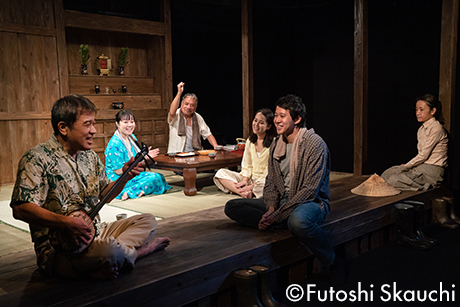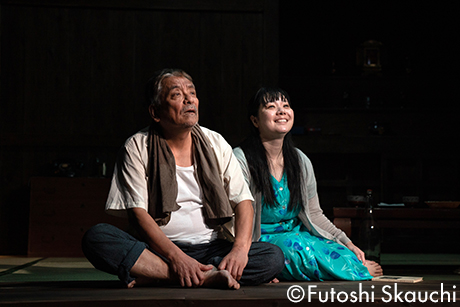

KATABUI, 1972
(Nov. 30–Dec.4, 2022 at Himeyuri Peace Hall)
Photo: Futoshi Sakauchi
Data
:
Premiere: 2022
KATABUI, 1972

Born in Saitama Prefecture in 1975. She belongs to the theater group EN and is a playwright and director. In 2002, she founded the theater company Green Flowers. She has a reputation for her family dramas based on meticulous research/interviews and depicted in a gentle and warm style of writing. In 2014, she won the Best Work prize in the Yomiuri Theater Award for Hatsuhagi no Hana (written and directed by Saito) performed by the theater group EN, and it was nominated for the 18th Tsurutani Namboku Drama Award. In 2020, she was nominated for the 65th Kishida Drama Award for Hikari sasu Mori (writer and director) performed by the theater group EN. In 2022, she won the Individual Award at the 57th Kinokuniya Theater Awards for the theater group EN production of So ha, Fuku no yoru tokoro (written and directed by Saito). Her play Katabui (Squall), 1972 co-produced with ACO Okinawa and Theater Office Natori won the 26th Tsuruya Namboku Drama Award and the 10th Hayakawa “Tragic Comedy” Award.


KATABUI, 1972
(Nov. 30–Dec.4, 2022 at Himeyuri Peace Hall)
Photo: Futoshi Sakauchi
Data
:
Premiere: 2022
Prologue:
May 15, 1972. Seiji Namihira listens to Prime Minister Eisaku Sato’s congratulatory speech at the “Okinawa Return Commemorative Ceremony” (held at Nippon Budokan) played on the radio.
Scene 1:
Six months ago, in December 1971. Seiji, a 73-year-old sugarcane farmer with a side job as a taxi driver, returns home from farm work with Yumi, who is staying at his home. Then, unexpected guests come to visit one after another.
Nobuo Ishimine, Seiji’s son-in-law, who works at a construction company, brings with him Takashi Sugiura, a young man he met earlier. It is said that Takashi came from Tokyo to travel to Okinawa before its return to Japan officially takes place. Nobuo suggests that in return for helping with the sugarcane harvest, Sugiura could stay at Seiji’s house.
Then, Seiji’s granddaughter, Megumi (Nobuo’s daughter), a college student, returns to Seiji’s house from Tokyo for winter vacation. Sugiura is surprised to see Megumi. In fact, the two were lovers and had only recently broken up. Yumi joins them and they all go out to the fields to work on harvesting the sugar cane.
Sugiura is surprised to see a roaring American B52 bomber jet up close, but everyone says the bombers are an everyday scene.
Scene 2:
Ten days later. Nobuo and his wife, Kazuko, who is a junior high school teacher, are discussing the relationship between Seiji and Yumi. Nobuo tells her to leave it be, but Kazuko says that it is a problem because the people around Seiji are talking about it.
Yumi and Megumi return from the fields. Nobuo goes to the kitchen saying that he will make miso soup with Kandabar (sweet potato leaves and stems), an Okinawan ingredient. When Kazuko directly asks Yumi about her identity, she says that she is hiding from her second ex-husband, who became violent after being fired from his job at the US military base. Yumi says that she will be leaving soon so as not to cause trouble for Seiji.
Sugiura and Seiji also return from the fields, and in the living room, food and rice wine are prepared. Sugiura took a leave of absence from university fueled by defiance against his father who is a member of the Tokyo Metropolitan Assembly to come to Okinawa during the intensifying anti-government student movement. He tells Kazuko that, while many people in Tokyo try to hide the fact that they are from Okinawa, he was moved by Megumi’s ability to proudly express the feelings as a native Okinawan in front of the young people who came to those opposition meetings.
The banquet begins with Nobuo’s food and Okinawan Awamori liquor, and Yumi begins to dance to the sanshin (banjo) accompaniment played by Nobuo and the singing of the Okinawan folk song “Kanayo.” Sugiura asks why only Okinawa has been placed such a situation as this. Nobuo says, “As a carpenter, I destroyed fields and houses with my own hands to build a base for the U.S. military, and it is better for a local person who knows the true pain involved in it all to do it than for a Japanese mainlander who knows nothing about that pain to do it.”
Scene 3:
That night. Megumi appears as Sugiura is playing the sanshin and singing “Seikatsu no Gara (The Pattern of Life),” a song by Wataru Takada based on a poem by Okinawan poet Baku Yamanoguchi. The two begin to talk about their feelings about their families and Okinawa. Megumi says that going to Tokyo allowed her to rethink what Okinawa meant to her.
Yumi appears with her bag. After Sugiura leaves, Megumi confesses that the reason she broke up with him was that she thought the hierarchy of the family was too different and it wouldn’t work, and then she heads to her bedroom.
Yumi notices Seiji lying drunk. Seiji, who says that he pretended to be asleep from the middle of the evening, tells Yumi that she can stay at his home even after the harvest work is over.
Scene 4:
March of the following year. Yumi is no longer there, and her whereabouts are unknown.
On the day he finishes harvesting this year’s sugarcane, Sugiura proposes to Megumi, but she doesn’t accept. Sugiura tells Seiji that he wants to stay until May, when Okinawa will be returned to Japan, to learn more about Okinawa.
Seiji reads Yumi’s letter that has just arrived. She says that she started working at a place after being introduced by the manager of the bar where she used to work, and she is doing well. However, then there is a phone call and Seiji is informed of the news in the newspaper of Yumi’s murder in a double suicide forced on her by her ex-husband.
Megumi insists that this happened because Kazuko had told Yumi to leave. Seiji controls it and reminds Megumi that Yumi would not have been pleased by such an attitude.
Scene 5:
May 15, 1972, the day of Okinawa’s return to Japan. It was raining outside.
Sugiura appears at Seiji’s home and finds him praying in front of the Buddhist altar. Sugiura, who says he is about to participate in the demonstration, says that seen from a Tokyo perspective, Okinawa is like a “katabui” squall where it rains in an isolated spot in the distance, and (to many in Japan) it must be seen as something happening in the distance, like a fire on the far shore of the sea (that is not a threat to those who see it).
Kazuko appears to participate in the demonstration. Nobuo, who became a full-time employee of a construction company, refused to participate. Kazuko, who knows of Nobuo’s love for Okinawa, tells Sugiura that she should accept (Nobuo’s) feelings of not being able to participate in the demonstration.
To Kazuko, who says she regrets what happened to Yumi, Seiji confides that he was surprised at his own coldness at first, when he couldn’t understand why her ex-husband had killed Yumi, and that if he was going to die, he should have died alone. If he wanted to help Yumi, he should have thought about helping her ex-husband, too. Because most people are weak by nature, and it is very difficult for them to help others. That’s why I want to try to care for others. This is where the future of Okinawa lies, says Seiji.
Epilogue:
Demonstrators are holding “No Return” placards in the rain. In the living room of the Namihira family, Seiji listens to the voice of Chobyo Yara, the governor of Okinawa Prefecture speaking on the radio.
Related Tags